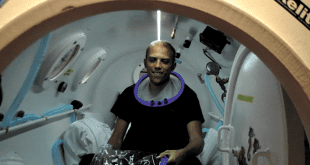By Brian Matier, M.D.
 Colon cancer is now the third most common cause of cancer and the second most common cause of cancer deaths in the United States. It affects nearly 1 in 20 people. Due to the increase in awareness of the importance of colonoscopies, there is a significant decrease in the number of deaths from colorectal cancer. If caught early, your chances of survival are better. Surgery increases the survival rate when colorectal polyps or tumors are caught early, and robotic colorectal surgery is paving the way for more efficient and effective outcomes.
Colon cancer is now the third most common cause of cancer and the second most common cause of cancer deaths in the United States. It affects nearly 1 in 20 people. Due to the increase in awareness of the importance of colonoscopies, there is a significant decrease in the number of deaths from colorectal cancer. If caught early, your chances of survival are better. Surgery increases the survival rate when colorectal polyps or tumors are caught early, and robotic colorectal surgery is paving the way for more efficient and effective outcomes.
It’s very beneficial to have an early diagnosis, as these show a greater than 90% success rate, with surgery being the only treatment necessary. In more advanced cases, individuals may also need to have radiation therapy or chemotherapy. It’s important to mention that even in advanced cases where resection of the bowels is necessary, we still see over 90% of these patients that do not require a colostomy bag.
In our practice, we utilize laparoscopic and robotic surgery for optimal outcomes for patients regarding precision and healing.
Robotic surgical systems were first launched more than 20 years ago and were much different than the advanced robotic systems we use today, which are pioneering new techniques and creating safer, more efficient surgeries with optimal outcomes.
Robotic surgery is a minimally invasive method that typically utilizes a few small ports, as opposed to a full incision. The 3D video technology is magnified to the highest definition. The surgeon controls tiny instruments that can twist, bend, and rotate in ways that no human hand could ever orchestrate conventional surgical instrumentation. The surgeon can visualize the field at a greater magnification and has unprecedented control from the monitor to move the tools with ease.
Robotic Surgery
Robotic surgery provides much more advanced techniques and the ability to do complex surgical procedures without large incisions. Robotic surgery reduces the risk of infection, patients recover much faster with less pain and complications, and the smaller incisions are cosmetically more pleasing. For example, when I do a colon resection, I typically put the incision in the bikini line to hide the scar.
Laparoscopic procedures may increase the risk of hernias around the port’s belly button site; robotic surgery significantly reduces the risk of hernias. With traditional colorectal surgery, or even laparoscopic surgery, large or multiple incisions must be made in different areas of the abdomen to allow room for the instrumentation, endoscopic camera, and surgical movements.
During robotic surgery, the tissue and organs are magnified to 20x more than the naked eye, providing superior precision. Robotic surgery allows me to do the entire surgery inside of the abdomen.
Advanced Robotic Techniques
I’ve been using an advanced technique that is creating a lot of attention worldwide. We refer to it as a Transanal Extraction. It’s a technique in which we remove the diseased part of the colon through the rectum instead of extracting it through the abdomen. This eliminates large incisions that patients usually need to remove part or sections of the colon. Patients have less risk of infection and recover very quickly with much less pain.
Another groundbreaking technique that we use is a Transanal Minimally Invasive Surgery (TAMIS), which is used to remove tumors and growths that are usually benign or precancerous. We can also remove these through the rectum instead of through the abdomen, which is ideal for the patient and surgeon. In these types of surgeries, the space is tight and confined. With robotics, the small instruments and the tiny, intricate movements for complex cases is groundbreaking for patient results.
Brain Matier, M.D.
Dr. Brian Matier is board certified in general, colon, and rectal surgery. He completed his undergraduate degree in biotechnology at Brock University in St. Catharines, Ontario, Canada. Dr. Matier then earned his Doctor of Medicine from St. George’s University School of Medicine in Grenada, West Indies. He continued his medical education by completing a general surgery residency at Danbury Hospital and a colon and rectal surgery fellowship at the University of Buffalo.
Dr. Matier treats a wide range of colorectal diseases, with expertise in treating colorectal cancers, anorectal diseases, hemorrhoids, inflammatory bowel disease (Crohn’s Disease and ulcerative colitis), diverticulitis, and pelvic floor disorders (fecal incontinence, constipation, rectal prolapse). Dr. Matier has a particular interest in minimally invasive and robotic surgery and uses the most advanced, up-to-date methods and technology for the benefit of his patients. He also performs diagnostic, therapeutic, and screening colonoscopy. He is a fellow of the American College of Surgeons, a member of the American Society of Colon and Rectal Surgeons, and a diplomat or the American Board of Surgery and the American Board of Colon and Rectal Surgery. Dr. Matier is affiliated with St. Joseph’s Hospital.
Bay care Medical Group
General, Colon and Rectal Surgery (Tampa)
4301 N Habana Ave
Tampa, FL 33607
(813) 879-5010
 Central Florida Health and Wellness Magazine Health and Wellness Articles of the Villages
Central Florida Health and Wellness Magazine Health and Wellness Articles of the Villages


